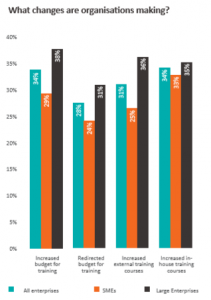The ultimate employee experience: provision of life-long learning
Currently, employers are facing challenges to retain their employees and keep them loyal to their company. Due to the gig economy, ‘a labour market characterized by the prevalence of short-term contracts or freelance work as opposed permanent jobs ’ (Oxford Dictionary), employees tend to switch jobs faster. This leaves employers desperately seeking new talent that will eventually leave soon as well. The Next Tourism Generation field research shows that low rates of staff retention is a major challenge because tourism and hospitality jobs are not attractive due to the poor image this labour market has.
However, opportunities arise as the strict boundaries between occupations and tasks of jobs and professions in tourism and hospitality are already disappearing. Employees are often employable in different departments within a company. In order to improve the image of tourism careers, create more awareness about different skills sets and opportunities for career progression within this industry, there is a need for a new, innovative approach to employee development. This blog focuses on the challenges and opportunities facing employers and how they can boost employee retention by encouraging life-long learning at work to enhance the personal and professional development of their staff.
Challenges of fast development of digital skills for different generations
Zooming in on the digital skills requirements nowadays at most companies, data analysis seems to be one of the key elements, according to the NTG research. However, employers are struggling to find employees with the right digital skills to create an impact with emerging technologies. Employers and employees lack the capabilities to integrate new technologies or data sources successfully. Education provides basic digital skills but then it is up to the employee to focus on and motivate themselves to undertake continuous learning. This is important in order to keep up with new developments of digital technologies and tools that are important in today’s work environment.
Education at work
Internal training is necessary for both employers and employees to continuously learn new things and keep up with fast paced development. In addition to learning new relevant knowledge, studies also show that investing in education at work leads to staff feeling more valued and secure about their role in the company (Brown et al, 2016; Craig, 2018). In order to make this additional education possible, organizations are investing in training to provide the right skills sets. Figure 1 shows the amendments in budgets done by organizations.

Figure 1: What changes are organizations making? (Open University, 2019)
Employees are often seeking meaningful connections in their jobs so that they stay engaged, motivated and onboard. In this gig economy, employers are seeking innovative ways to keep their staff onboard by meeting employee (Open University, 2019) . According to Wiebes (2019), the so-called ‘evolution of employee experience’ knows three stages:
- Age of productivity: need to work here
- Age of engagement: like to work here
- Age of experience: want to work here
Employees are seeking places of work where they want to work. But what defines whether someone wants to work at a specific place? There are several elements that play a major role.
Employee experience: development, meaningful connections and security
After staff retention, the next priority of businesses is to keep improving their customer experience. In a time of finding the right talented staff for your company, it is up to employers to stand out from the crowd, attract the right employees, and retain their talents instead of just filling the open positions with non-qualified employees.
Treat your staff as how you want to be treaded
Employers are operating a different role now, as they are responsible for boosting the skills of existing staff so that they are comfortable and secure about the usage and implementation of more new digital tools. Employers have to convince their employees that continuous learning in the workplace offers great career progression. However, Open University (2019) says that 67% of the youngsters in the UK see the benefits and are motivated to actively participate in life-long learning. On the other hand, 26% of employees who are 55+ see the benefit of life-long learning which results in a challenging task for employers to make this specific group motivated to invest in life-long learning.
“Employers must provide development more quickly, move people more regularly, give employees more tools to manage their own careers “
Brown et. Al. (2016)
NTG research
According to the European NTG research interviews, life-long learning is one of the main critical skills needed. As jobs and professions are shifting to learning and the development of skills, training and learning will become key. Jobs will become more flexible and fluid as employees will be expected to be able to work in different departments. Think of the food and beverage sub-sector: both service has to be delivered as well as back-office tasks such as orders, making sure the digital reservation tools are up to date. If businesses are offering additional training to employees to upgrade their skills, their capabilities may become relevant to more than one department and this will enable them to switch between specific jobs in a business.
How does your business encourage life-long learning? And, how do your employees respond to the continual need to keep improving their skills?
By Lorainne van Liere, involved in the project communication of the Next Tourism Generation Alliance, a European funded project that focuses on creating a future-proof tourism industry based on addressing digital, green and social skills gaps in 5 tourism sub-sectors: hospitality, food and beverage, travel agencies and tour operators, visitor attractions and destination management. Also, a tourism fanatic, looking for digital innovations and ideas to implement in the industry.
Follow the efforts of the Next Tourism Generation via our website, Facebook, Twitter | #NTGskillsalliance or via LinkedIn




No Comments